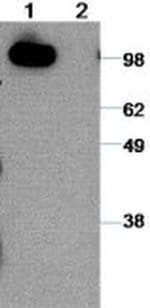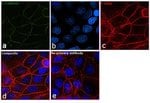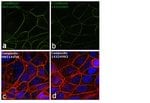Learn More
CD324 (E-Cadherin) Monoclonal Antibody (DECMA-1), eBioscience™, Invitrogen™
Rat Monoclonal Antibody
Brand: Invitrogen 14-3249-82
Description
Description: The monoclonal antibody DECMA-1 recognizes mouse, human and canine CD324 also known as E-cadherin (Epithelial cadherin) or uvomorulin. Like the other cadherin family members P and N cadherin, E-cadherin is a transmembrane glycoprotein involved in intercellular adhesion. These proteins share a common basic structure. The extracellular portions of the proteins are largely composed of repeating domains, each with two consensus Ca2+-binding motifs. The cytoplasmic domain interacts with a-, b-, and g-catenins and actinins. These catenins connect E-cadherin with the cytoskeleton. Expression is found in most epidermal cells including melanocytes and kerotinocytes. E-cadherin is localized at the intercellular boundaries of epithelial cells in several tissues, and is thought to play a role in maintece of tissue integrity. Loss of E-cadherin function has been implicated in the progression of a variety of cancers. E-Cadherin protein is sensitive to trypsin treatment, so exposure to trypsin should be minimized or avoided. The monoclonal antibody DECMA-1 has been shown to have functional activity by disrupting adhesion in human, mouse and dog cells. Applications Reported: This DECMA-1 antibody has been reported for use in flow cytometric analysis, immunoprecipitation, western blotting, immunohistochemical staining of frozen tissue sections, and ELISA. (Please use Functional Grade purified DECMA-1, cat. 16-3249, in functional assays.).
E-Cadherin (epithelial cadherin) is a classical cadherin from the cadherin (alcium dependent adhesion protein) superfamily. The encoded protein is a calcium dependent cell-cell adhesion glycoprotein comprised of five extracellular cadherin repeats, a transmembrane region and a highly conserved cytoplasmic tail. Mutations in this gene are correlated with gastric, breast, colorectal, thyroid and ovarian cancer. Loss of function is thought to contribute to progression in cancer by increasing proliferation, invasion, and/or metastasis. The ectodomain of this protein mediates bacterial adhesion to mammalian cells and the cytoplasmic domain is required for internalization. Identified transcript variants arise from mutation at consensus splice sites. E-cadherin plays a central role in the growth and development of cells by controlling tissue architecture, and maintenance of tissue integrity. In humans, E-cadherin is encoded by the CDH1 gene present on chromosome 16. Studies have demonstrated that reduction and/or loss of E-cadherin expression in carcinomas correlates positively with the potential of these tumors for invasion and metastasis.
Specifications
| CD324 (E-Cadherin) | |
| Monoclonal | |
| 0.5 mg/mL | |
| PBS with 0.09% sodium azide; pH 7.2 | |
| F1PAA9, P09803, P12830 | |
| CDH1 | |
| Affinity chromatography | |
| RUO | |
| 12550, 442858, 999 | |
| 4° C | |
| Liquid |
| ELISA, Flow Cytometry, Functional Assay, Immunocytochemistry, Immunohistochemistry (Frozen), Immunoprecipitation, Western Blot | |
| DECMA-1 | |
| Unconjugated | |
| CDH1 | |
| AA960649; ARC-1; cadherin 1; cadherin 1, E-cadherin (epithelial); cadherin 1, epithelial; cadherin 1, type 1; cadherin 1, type 1, E-cadherin (epithelial); cadherin e; cadherin-1; cadherin-E; calcium-dependent adhesion protein, epithelial; CAM 120/80; CD324; CDH1; CDHE; cell adhesion molecule; cell-CAM 120/80; ECAD; E-cad; E-Cad/CTF1; E-Cad/CTF2; E-Cad/CTF3; Ecadherin; E-cadherin; E-cadherin 1; E-cadherin precursor; Epithelial cadherin; hab; half baked; LCAM; L-CAM; Um; UVO; Uvomorulin | |
| Rat | |
| 100 μg | |
| Primary | |
| Canine, Human, Mouse | |
| Antibody | |
| IgG1 κ |
Your input is important to us. Please complete this form to provide feedback related to the content on this product.
For Research Use Only.









